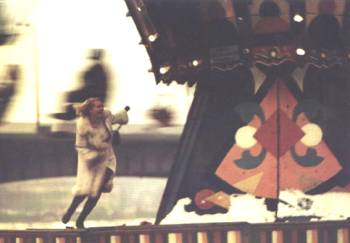 | ||||||||||
Wszystko na sprzedaz [Everything For Sale]
 fot: Renata Pajchel |
I had always wanted to work with Cybulski whom, although he starred in only four of my films, I also had the pleasure of directing twice in the theatre. Zbyszek was more than just an actor: he himself was a character worthy of being transferred onto the screen.
One evening in 1967, in London, I was discussing the idea of such a film with David Mercier. He knew Zbyszek well, so we had a great time remembering all the numerous anecdotes around which we could build the screenplay. Late at night, when I returned to my hotel room, Roman Polanski called to tell me that Zbyszek was dead. His death on that particular night seemed to me utterly unreal, like another episode from the planned film and it took me some time to absorb the truth of the finality of it: Zbyszek would never again act in any of my films.
Prior to beginning work on Everything for Sale, I shared my doubts with readers of the monthly magazine "Kino":
I can use neither his name, nor a photograph of him, not even fragments of his films. I used to think that the one great film that would crown Zbyszek's acting career was still before him. The characters in my film follow in his footsteps, quote anecdotes about him, brush against his props and the places that are still warm from his touch. He had entered their lives - our lives! - somehow disturbing and shaking them up. We had always sensed his passion and his violent intensity. All who worked with him found him an exceptionally inspiring personality with a gift for inventing countless spectacular episodes. He was a bit of a dreamer. I hope he will turn out like this in my film.
Everything for Sale is not a film aimed against actors. It is a film about people who make films.
The fact that the actors appear under their own names is not accidental. Why should I change their names when I had asked them to speak their own words? They say what they want. I knew from the very beginning who would act in my 'jumbo sale.' The only problem was who would play the film director.
To tell the truth, for quite a long time that I thought I should play the part myself, but finally decided not to. Not being an actor, I would not have played it even half as well as Andrzej Lapicki. (...)
Andrzej Wajda
Reviews
Everything for Sale is, in my opinion, an excellent and exceptional, not to say (I hate the word) a ground-breaking film. But contrary to the public wisdom, it is not a film about Zbigniew Cybulski and the impression he made on the minds of those closest to him; it is simply a film about Andrzej Wajda. And also the most personal film that creative cinema has known since 8 1/2. (...) Moreover, I shall venture the opinion, that a film about Cybulski had indeed been Wajda's original intention and it was only during the making of the film that the brilliant director realized that he was in fact, quite unintentionally, making a film about himself. (...)
The Actor expresses the truth about people living through a major historical breakthrough; he is marked by the Polish obsession with history. Daniel recalls it only slightly, like a trance: there is an authenticity to his chase, to which, however, the director holds no key. The combination of acting, stunt and sporting skills seems to baffle him, even though he tries hard to believe that this is the new metaphysics of the young generation - a metaphysics of things tangible and measurable rather than of gestures and hallucinations.
Krzysztof Metrak
"Film", Warsaw, 9 February, 1969
In Everything for Sale, there is a recurrent, abrupt cessation of action. The screech of train wheels in the opening scene echoes throughout the film as cars, projects, parties and relationships shudder to a halt. At the same time, there are two images which by contrast are emphatically continuous: the spinning roundabout on which Ela imprisons the sophisticated film crowd she loathes, and the surging gallop of horses (also running in circles) which punctuates the film and eventually brings it to a close. Wajda's comment is one of paradox: that although everything stops when a man dies, everything also goes on, like it or not. (...) So the second stage of Everything for Sale is a definition of the film director in general and of Andrzej Wajda in particular. (...) Everything they had (or imagined they had) was for sale and they sold it; now Wajda even sells Cybulski's death, and his own loss of direction, for the sake of the cinema.
Philip Strick
"Monthly Film Bulletin", London, February 1969
This film is available at the Merlin bookstore
Oscar | Films | Theatre | Why Japan?
Favourites | Pictures gallery | About Wajda | Bibliography
Main Page | Search | Wersja polska
Copyright © 2000 Proszynski i S-ka SA. All rights reserved